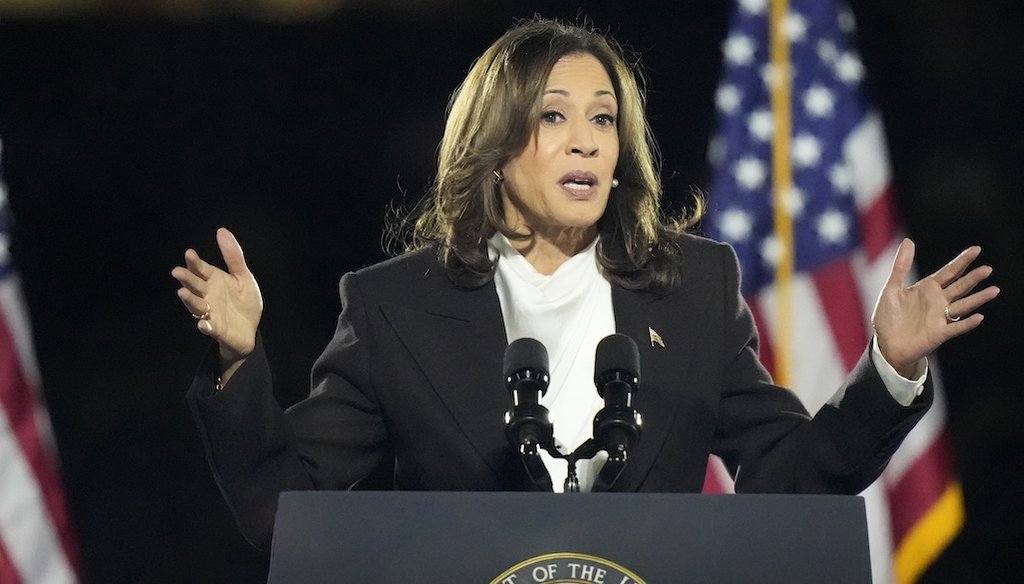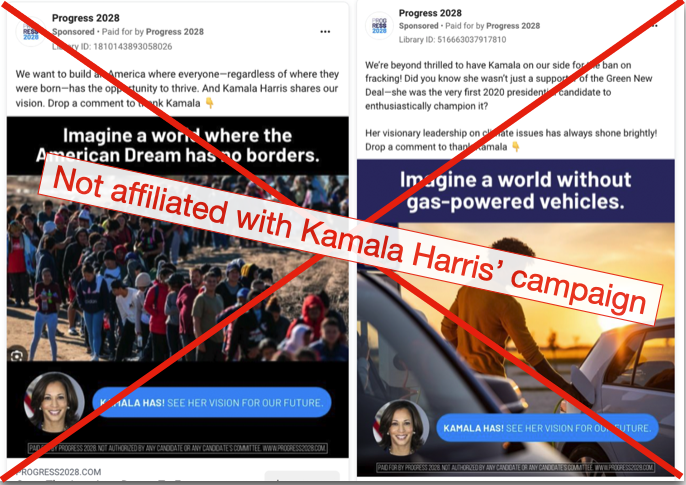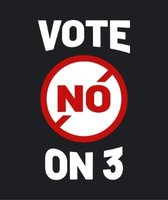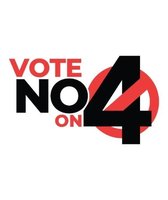Stand up for the facts!
Our only agenda is to publish the truth so you can be an informed participant in democracy.
We need your help.
I would like to contribute

Democratic presidential nominee Vice President Kamala Harris delivers remarks during a campaign event at the Ellipse near the White House in Washington on Oct. 29, 2024. (AP)
A conservative group supporting former President Donald Trump spent $350,000 on Facebook and Instagram ads in the final days before the election to sway voters in battleground states away from Vice President Kamala Harris.
You wouldn’t know it from looking at them; the ads from "Progress 2028" look as if they are supporting her.
The ad library for Meta, Facebook’s parent company, now shows five active ads running since Oct. 25 in Arizona, Georgia, Michigan, Nevada, North Carolina, Pennsylvania and Wisconsin.
The ads say misleading things about Harris’ policy views, next to her picture:
-
"We’re beyond thrilled to have Kamala on our side for the ban on fracking! … Imagine a world without gas-powered vehicles. Kamala has! See her vision for our future."
Sign up for PolitiFact texts
-
"Under Kamala's compassionate leadership, no undocumented immigrant would be left behind when it comes to receiving crucial Medicare benefits. Drop a comment to thank Kamala."
-
"Kamala Harris will champion the right for minors to access the care they need without fear of parental intervention or discrimination. Let’s work together to transform our schools into the most trans-friendly environments possible!"
One ad asks people to "imagine" a world where "the American Dream has no borders," saying Harris holds this view. Another ad claims she supports a "mandatory" gun buyback program, which we rated False.
The group behind the ads is conservative nonprofit Building America’s Future, according to documents obtained by OpenSecrets, a nonpartisan, nonprofit organization that tracks money in politics. Virginia’s State Corporation Commision shows that the PAC registered Progress 2028 in late September as a "fictitious name," which is an alternative name that a corporation can use other than its legal name.
Some of the ads’ claims stem from past positions Harris no longer holds; others promote policies she’s never supported.
For example, Harris in 2024 said she doesn’t support a ban on hydraulic fracturing, aka fracking, departing from a previous position she held in 2019 as a Democratic presidential primary candidate. She has supported fracking since 2020, when she joined Joe Biden’s presidential ticket.
Harris during her 2019 campaign also supported a mandatory buyback of assault weapons. In 2024, she supports banning assault weapons, but not mandatory buyback programs.
Although Harris supports access to gender-affirming care, we found no evidence she said she believes that parents shouldn’t be involved, as one Progress 2028 ad claims. In the context of adults receiving the care, Harris has repeatedly said that such decisions should be left to doctors and their patients.
One ad says to "imagine a world where being undocumented doesn’t mean being uncovered. Kamala has," referring to Medicare benefits.
But immigrants in the U.S. illegally aren't eligible for Social Security and Medicare, and Harris hasn’t proposed changing that. In Harris’ 2019 campaign, she expressed a willingness to include immigrants in the U.S. illegally to qualify for universal health care, but Harris hasn’t expressed similar views since the 2020 presidential race.
Instead, she has spoken about a pathway to citizenship that would let some people in the U.S. illegally qualify for Medicare and Social Security over time. People who are legally allowed to work in the U.S. can receive Social Security retirement benefits after working and paying Social Security taxes for 10 years.
A Harris campaign aide called the effort "desperate." PolitiFact tried to reach the political action committee running the ads by email Oct. 31 and did not receive a response.
The Republican PAC behind Progress 2028
Building America’s Future raised more than $100 million over the last four years from a dozen individual and corporate backers, The New York Times reported. Tech entrepreneur Elon Musk is one of them, according to The Wall Street Journal.
The group's late-election ad campaign links to a two-page website styled as a progressive version of Project 2025, the multigroup conservative policy blueprint for a Republican administration. Camouflaged as a pro-Harris-Walz campaign website, the Progress 2028 website lays out Harris’ "sweeping reforms that will ensure that equity across every corner of America."
Website headers echo Democratic-sounding slogans, such as "Empowering Undocumented Immigrants, Building Our Future" and "Reducing Gun Violence: Bold Steps for a Safer Future." But the listed policies do not align with Harris’ agenda.
Previously, Building America’s Future ran contradictory ads aimed at Muslim and Arab voters in Michigan and Jewish voters in Pennsylvania with opposing messages about Harris’ stances on Israel’s war in Gaza, according to 404 Media.
The group is also sending text message ads to voters. And unlike Meta, phone companies don’t share databases on political text messaging, making it difficult to track. Any information about these texts typically comes directly from people receiving them. One Republican voter in Pennsylvania shared some with 404 Media, saying he got "fake Harris campaign" messages from Progress 2028 that said to "imagine a world where we get dangerous guns off our streets — for good," promoting the gun buyback program, among other messages. The online ads say they are paid for by "Progress 2028," but the texts contain no disclaimer.
Tech platforms and ads
Meta’s ad policy requires that entities paying for ads be disclosed. Robert Weissman, co-president of the nonprofit watchdog group Public Citizen, told NPR the "paid for by Progress 2028" disclosure at the bottom of the ads furthers the deception.
"It truthfully discloses who is paying for the ad, but that entity sounds like a Harris supporting organization, when it is not," Robert Weissman, co-president of the nonprofit watchdog group Public Citizen, told NPR for an Oct. 30 story. NPR noted Weissman has called on Meta to remove the ads.
Meta said Progress 2028 did not meet the standard for removal under the company’s inauthentic behavior policy, which refers to different forms of deception, including people misrepresenting themselves and using fake accounts.
Meta’s third-party fact-checking program allows independent fact-checkers, including PolitiFact, to rate false claims and hoaxes that appear in posts or ads on its platforms, as long as the claims are not from politicians or expressing an opinion, among other criteria. Meta’s program allows for a claim to be rated "missing context," for example, if it "implies a false claim without directly stating it."
Meta spokesperson Ryan Daniels said some of Progress 2028’s content "falls outside the scope of Meta's fact-checking program guidelines," without elaborating, so it is not covered by the program.
"This type of political advertising isn’t new and has been found across the media landscape for decades," Daniels said in a statement.
In a tactic echoing Progress 2028’s approach, some Democratic-aligned groups in 2022 Senate, House, and gubernatorial primary races aired ads that boosted more conservative, Trump-aligned Republican candidates over their GOP competitors, because the groups saw those candidates as easier for Democrats to beat in the general election. The ads, however, generally portrayed the candidates’ views accurately.
"There's a general issue with political advertising where you know it's hard to say what exactly is accurate or not accurate, and there's a desire to protect political speech, which I assume is what is behind the Meta policy," said David Rand, a Massachusetts Institute of Technology professor who has written about online misinformation. "But this feels really different. It's not about political speech, it's about very clearly being deceptive, and I think that any reasonable person would conclude that."
It’s difficult to know whether the ads have appeared on other platforms. X’s ads repository doesn’t allow searching for ads targeted to users in the United States. TikTok banned political ads on the platform in 2019, although some may have managed to skirt the rules. In YouTube’s ad database, Progress 2028 doesn’t come up as an advertiser.
Meta said it would block new ads about politics, the election and social issues the week before Election Day. The restriction period applies to new ads that started Oct. 29, so Progress 2028 ads will continue to run until the purchase period is over. Meta’s ad library doesn’t specify when that is.
The company started the policy in 2020, on the basis that there may not be enough time to address new claims in the election’s final days. Some critics from Democratic or voter advocacy groups said the restriction period will make it harder to mobilize voters and encourage turnout in the final stretch.
Meta’s election ads policy prohibits ads with premature claims of victory, ads that discourage people from voting, and ads that question the legitimacy of an ongoing or upcoming election. Meta considers the U.S. presidential election "ongoing" until a candidate has been sworn into office.
RELATED: Progress 2028 isn't tied to Kamala Harris. Ads saying she wants mandatory buyback program are False.
PolitiFact Staff Writer Grace Abels contributed to this report.
Our Sources
Meta Ad Library, Progress 2028 ads, Accessed Oct. 30, 2024
Progress 2028 website, Accessed Oct. 30, 2024
PolitiFact, Progress 2028 isn't tied to Kamala Harris. Ads saying she wants mandatory buyback program are False, Oct. 21, 2024
The Verge, An Elon Musk-funded super PAC is putting out fake pro-Harris ads, Oct. 29, 2024
Open Secrets, Pro-Trump dark money network tied to Elon Musk behind fake pro-Harris campaign scheme, Oct. 16, 2024
Open Corporates, Building America's Future, Accessed October 2024
Virginia State Corporation Commission Clerk's Information System, Accessed October 2024
CBS News, "Progress 2028" may look like a Democratic response to "Project 2025," but it's not, Oct. 28, 2024
The New York Times, Republican Operatives Function as Hidden Hand Behind Pro-Trump Efforts, Oct. 15, 2024
The Wall Street Journal, Elon Musk Gave Tens of Millions to Republican Causes Far Earlier Than Previously Known, Oct. 2, 2024
404Media, This Is Exactly How an Elon Musk-Funded PAC Is Microtargeting Muslims and Jews With Opposing Messages, Oct. 18, 2024
404Media, Elon Musk-Funded PAC Supercharges ‘Progress 2028’ Democrat Impersonation Ad Campaign, Oct. 29, 2024
NPR, An Elon Musk-backed political group is posting fake Kamala Harris ads on Facebook, Oct. 30, 2024
Meta, ad library search, Oct. 30, 2024
PolitiFact, Why are Democrats taking sides in GOP primaries?, Aug. 1, 2022
X, Ads repository, Accessed Oct. 31, 2024
TikTok, Understanding our policies around paid ads, Oct. 3, 2019
NBC News, Banned political ads found on TikTok weeks ahead of 2024 elections, Sept. 23, 2024
YouTube, Ads Transparency Center, Accessed Oct. 31, 2024
Meta, How is Facebook addressing false information through independent fact-checkers?, Rating options for fact-checkers, Accessed Oct. 30, 2024
Meta, Inauthentic Behavior, Accessed Oct. 30, 2024
Meta, Upcoming 2024 Restriction Period for US ads about social issues, elections, or politics, Sept. 30, 2024
Meta, How Meta Is Planning for Elections in 2024, Nov. 28, 2023
Email interview, Ryan Daniels, spokesperson for Meta, Oct. 31, 2024
Email interview, Kamala Harris campaign press office, Oct. 30, 2024
Email interview, David Rand professor at Massachusetts Institute of Technology, Nov. 1, 2024









































